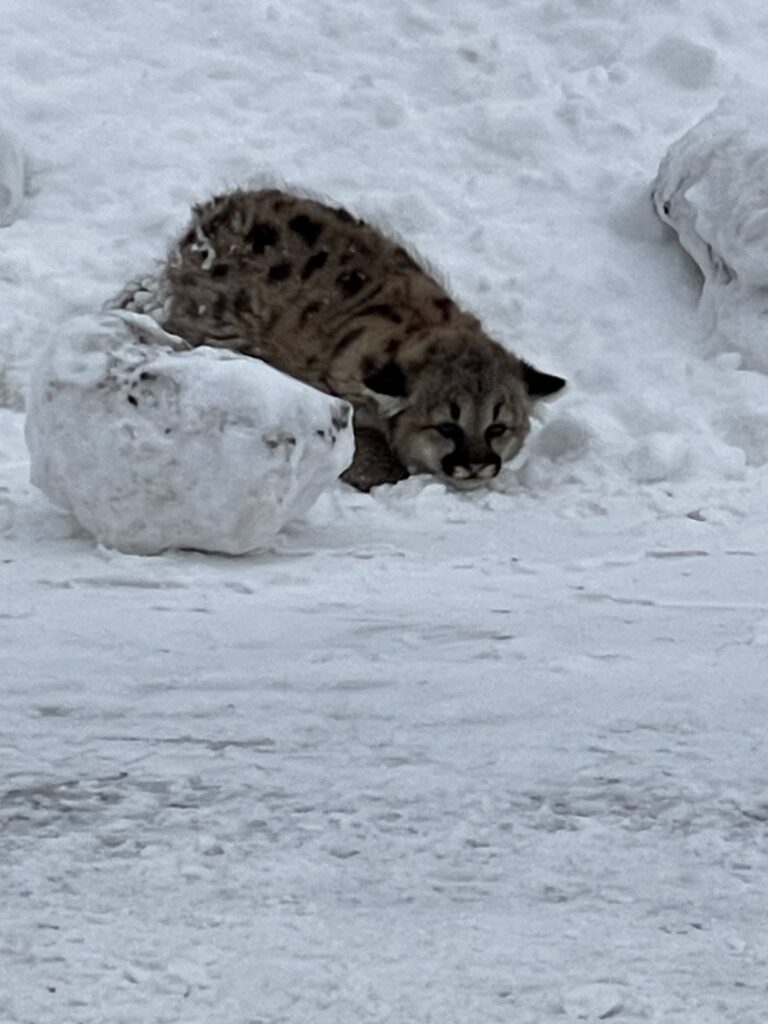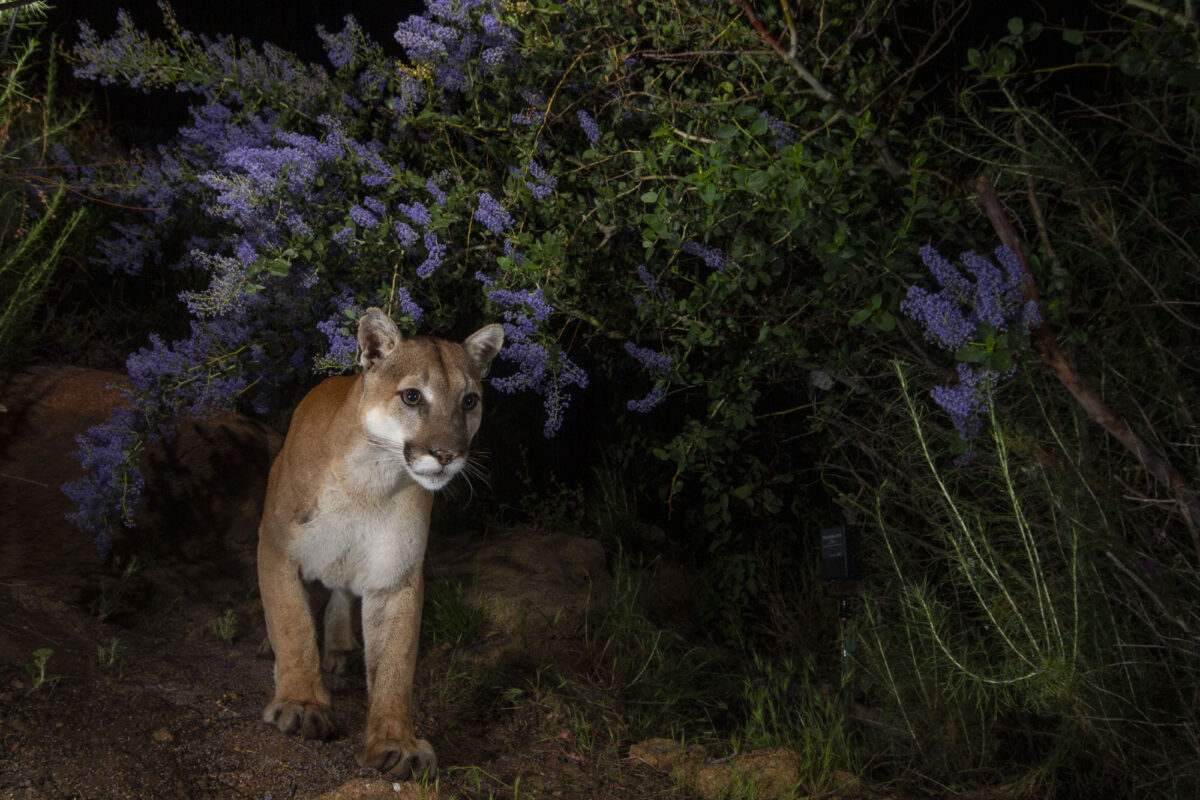
On March 13th, a motorist in Michigan caught sight of two wild, spotted cats along a rural, private road in Ontonagon County, in the western part of Michigan’s Upper Peninsula. The motorist stopped and took a few photos, and the cats were later verified by state agency biologists to be young mountain lion kittens, approximately 7–9 weeks old. The discovery of these cubs sparked a lot of excitement across the country, as well as many questions.
Why is this new sighting of cubs such a big deal?
Mountain lions once thrived in Michigan, but all of Michigan’s native lions were killed off by people more than 100 years ago. Today, while solitary males occasionally show up in Michigan, these are all young lions that have dispersed from their birthplaces further west, searching for territories to call their own. Established breeding populations of mountain lions exist in Nebraska and the Dakotas, for instance, and young males from these areas have been spotted in Wisconsin, Minnesota, Iowa, and Illinois as well. Males often travel hundreds of miles in search of new territories, but dispersing females are much more likely to settle down closer to home.
This new sighting is significant because it is the first verified sighting of young cubs in Michigan in over 100 years, indicating the presence of not just a male but also a female of breeding age.
Does Michigan have a breeding population of mountain lions now?
While this new sighting is very exciting for mountain lion advocates, it’s important to remember that young cubs face many challenges. In fact, most kittens do not survive to adulthood. In addition to the dangers posed by speeding vehicles, domestic dogs and poachers, for instance, young cubs can also fall prey to more natural threats such as wolves, bears, and coyotes, all of which are well established in the forests of Michigan’s Upper Peninsula.
Even if these cubs do survive to adulthood, a community of mountain lions needs more than just a handful of youngsters to be viable in the long term. When a lion population is isolated from other populations, it suffers from inbreeding and its members can experience genetic abnormalities that impact their survival. This is one of the reasons that scientists and wildlife advocates are so concerned about the genetic isolation of mountain lion communities in places like Florida, Washington’s Olympic Peninsula, and the south-central coast of California. (The latter population is under consideration for endangered species status, thanks to a petition by the Mountain Lion Foundation and the Center for Biological Diversity.) While every new population of mountain lions starts with just a few cubs, many more will be needed in Michigan before that state can boast an established breeding population.
How long will it take for mountain lions to fully recolonize Michigan and other states in the Midwest and East?
Recent research by some of the world’s leading cougar scientists has addressed this very question. In a paper published in August 2024, Thomas Glass and his colleagues looked at dispersal and survival rates of mountain lions at the eastern edge of the species’ current range in the U.S., and then ran probability scenarios, connecting those to likely habitat destinations. The bottom line is that natural recolonization will happen, but that it will happen very, very slowly. If we want thriving populations of mountain lions in these states anytime soon — especially the states that are farther east, like New England — some sort of proactive reintroduction of lions will likely be necessary.
In the meantime, states like Kansas have been giving some thought and attention to education programs that might be helpful for creating a welcoming environment for any new cougars that happen to show up. This recent story in the Milwaukee Journal Sentinel asked, If there are now cubs in Michigan, what does that mean for Wisconsin?
Were these cubs orphaned?

Young mountain lions are highly dependent on their mothers, and the mother of these healthy cubs in Michigan was hopefully somewhere nearby. Adult mountain lions tend to be very skittish around people, and it’s entirely possible that the mother was hiding while this brief encounter occurred, reemerging as soon as the motorist took off.
In addition, it is not unusual for a mother to leave her very young cubs for a few hours or even a day, while she goes out and kills a deer for them to eat. As they grow, cubs become more mobile and will begin to accompany her while she hunts.
That being said, even though mountain lions are state listed as endangered in Michigan and are therefore protected, poaching does occur. The cubs’ mother could have been killed illegally by hunters, or it may have been struck by a car. The cubs did not appear to be in poor health, though, so these scenarios seem less likely.
Where are the cubs now?
Following the sighting, the Michigan Department of Natural Resources set up multiple motion-activated cameras in the area, hoping to catch the mother and cubs on film — but no luck. Mountain lions tend to be mobile creatures, and mothers change dens with their cubs frequently. It seems that this small family has moved on to another area. In a phone call this week, Brian Roell, a Michigan DNR biologist, confirmed for us that the cubs have not been spotted again.
“It’s pretty exciting,” said Roell in a statement. “It really shows that we have a unique place in Michigan where someone has a chance to see a wolf, a moose and a cougar in the wild. It’s something that should be celebrated, that we have the habitat to support an elusive animal like this.” Here at the Mountain Lion Foundation, we’ll be keeping an eye out for more happy news from Michigan, with fingers crossed!



 Facebook
Facebook Twitter
Twitter Send Email
Send Email


